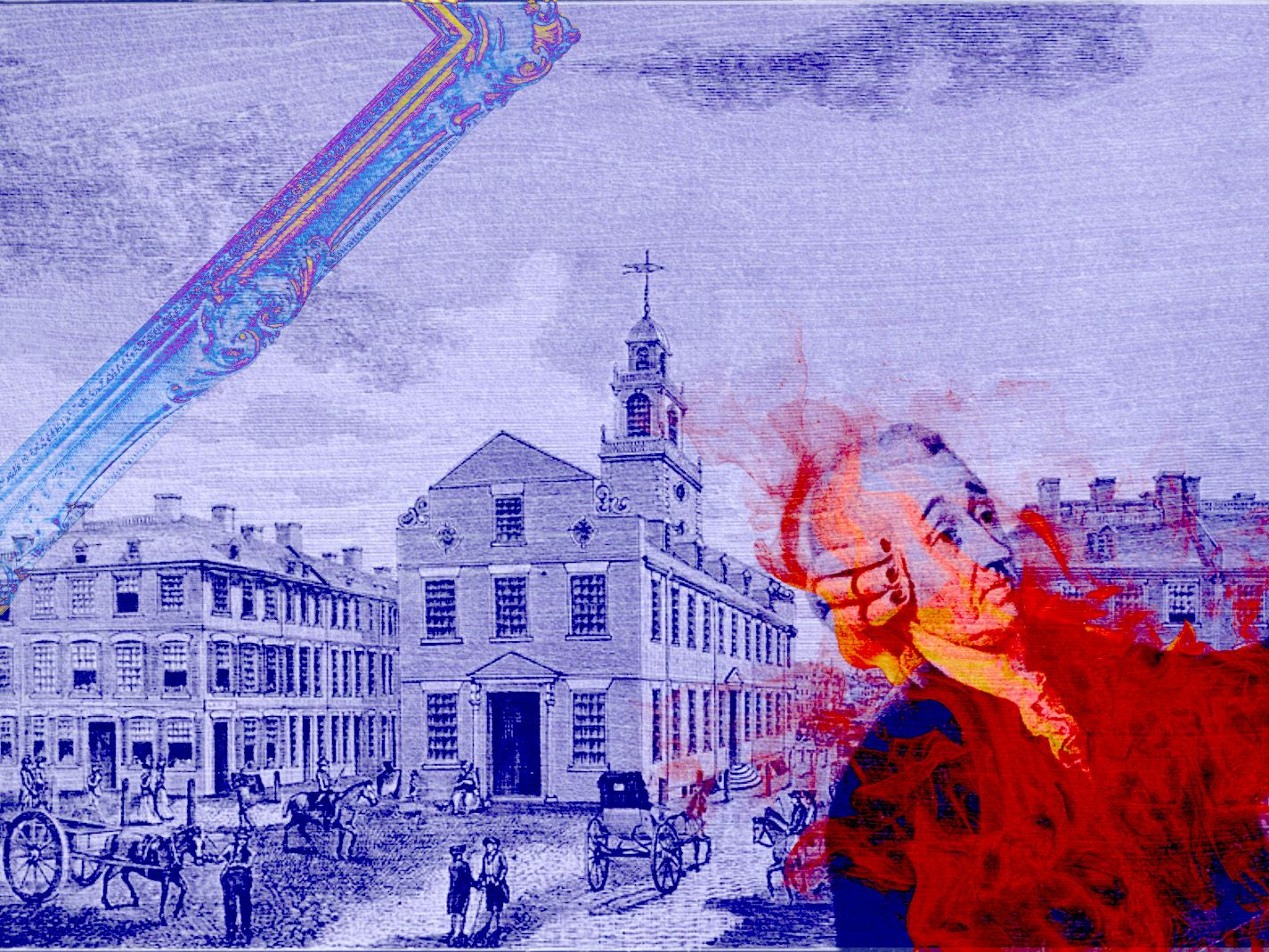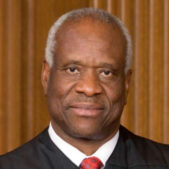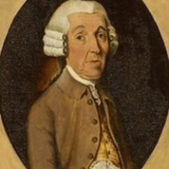
The nation’s 250 Anniversary is only 29 months away. The National Association of Scholars is commemorating the events that led up to the Second Continental Congress officially adopting the Declaration of Independence on July 4, 1776. This is the third installment of the series. Find the second installment here.
Because he has sought to “destroy the present form of Government … and establish an arbitrary and tyrannical Government in its stead, this House of Representatives … DO IMPEACH.”
Who?
Alejandro Mayorkas, the feckless Secretary of Homeland Security?

Alejandro Mayorkas — Photo by Zachary Hupp — Department of Homeland Security
President Joe Biden?

Joe Biden — Gage Skidmore — Wikimedia Commons
The left’s perpetual bogeyman, Supreme Court Justice Clarence Thomas?

Justice Clarence Thomas — The Oyez Project — Wikimedia Commons
Or—third time’s the charm—former President Donald Trump?

President Donald Trump — The White House — Wikimedia Commons
No, this broadside thundered at Peter Oliver, Esq., Chief Justice of the Supreme Court of Massachusetts Bay Province. On February 24, 1774, the Great and General Court of Massachusetts impeached Justice Oliver by a vote of 92 to 8. His was the first impeachment in the Colonies, a decisive step along the path to the American Revolution.

Peter Oliver — Prabook
Turkeys and Cannonballs
Oliver himself loudly denounced the Revolution as a “rebellion.” But apart from his strenuous tongue, in 1774, he might have seemed a surprising candidate for impeachment.
He was Massachusetts-born—in 1713—and bred. An ancestor, Thomas Oliver, emigrated to the New World in 1632, and his family members inhabited a constellation of offices in the colony. Peter attended Harvard College, where he ranked high in scholarship but, in perhaps some hint of trouble to come, was disciplined for stealing a turkey and a goose.
After college, he owned an ironworks, producing, among other useful items, cannonballs. His trade was profitable enough to allow him to build Oliver Hall in Middleborough, Massachusetts, which was known for its size, elegance, and beauty. That is, until his former fellow countrymen burned it down in 1782.
Oliver was named a justice of the peace in 1744, appointed to the Court of Common Pleas in 1747, to the superior court in 1756, and then elevated to Chief Justice in 1771. Here was a colonial success story.
What went wrong?
Drunks, Debauchees, and the Sordid Lust of Covetousness
Impeachment is rare in American history. Most federal impeachments have involved judges, typically for official misconduct—drunkenness on the bench is a no-no, and yet what about “In vino veritas?”
Presidential impeachment is all the rarer.
Andrew Johnson was impeached for firing a cabinet officer in violation of the Tenure in Office Act. Bill Clinton was impeached, not for defiling cigars, a dress, or even the Oval Office, but for lying to a grand jury and obstructing justice. And Donald Trump was impeached bigly—once on the charges of abuse of power and obstructing Congress, and then on the charge of inciting an insurrection. Yet, in all these cases, the Senate acquitted the defendants of the House’s charges.
Chief Justice Oliver did not defy acts of the legislature, dally with interns, nor incite an insurrection—except, perhaps, unintentionally. But for two years, he declined the meager compensation offered to him by the colonials in favor of a much more generous salary from the King.
This was enough for radicals—led by John Adams—to claim that Oliver was, in essence, accepting a “continual Bribe” out of “the Corruption and Baseness of his heart, and the sordid Lust of Covetousness.” The Massachusetts House even frothed that, by accepting the royal grant, Oliver would unite the King’s Ministry with the Judiciary, creating that “arbitrary and tyrannical Government.”
The Massachusetts Governor and his Council—the equivalent then of the Senate—refused even to consider the House’s indictment. Oliver was not removed from office. But, stirred up by Adams, Massachusetts citizens removed themselves from Oliver’s courts. Jurors refused to serve, the system of justice began to grind to a halt, and the province was one step closer to revolution.
Kings and Xi Jinpings
Impeachment is a puzzling feature of American politics. An ancient English custom, it holds a much higher place of honor in novelty-loving America. It’s named in the Constitution, but it violates the central Constitutional principle of separation of powers.
Though garbed in judicial robes, it’s strictly a political act. It carries no specific penalty—the indictment is the punishment. It plays into faction and, much like the old Athenian practice of ostracism, strokes democratic envy.
All that said, impeachment reflects the belief that public trust is the foundation for law, and so breach of that trust cannot be defined by law. Peter Oliver committed no crime by taking a salary from his King. Likewise, maybe no laws have been broken by the remarkable favor shown to the Biden family by Xi Jinping. Of course, the violation of public trust requires a public that feels itself violated. The true result of the impeachment of Peter Oliver was that a new public became conscious of itself and its power.
Art by Beck & Stone
Another perspective: https://founders.archives.gov/documents/Adams/06-02-02-0004-0001
Hawley was the one “River Baron” who joined the Patriot side and hence didn’t lose his land.
First, notwithstanding recent Kabuki Theater with Donald Trump, Impeachment is serious business because of the precedent established with the 1804 Impeachment of Samuel Chase, an Associate Justice of the US Supreme Court. Chase, an ardent Federalist, made no secret of his contempt for the Jeffersonians (Democratic-Republicans) and, amongst other things, made a rather intemperate speech to the Baltimore Grand Jury.
The Democratic-Republicans clearly did not like the Federalists, but while they had the votes in the Senate to convict Chase, they didn’t and thus established the principle that merely disliking someone wasn’t grounds for removal from office.
Corruption was, and numerous Federal judges have been removed from office over the years. Richard Nixon (never actually impeached) resigned when Barry Goldwater told him that there were not enough votes in the Senate to prevent his removal from office. But before our recent episodes of Kabuki Theater with Donald Trump, Impeachment used to be serious business.
Second, Middleborough is located 41 miles from Boston in a community today best known for cranberries, it’s where Ocean Spray is located. In the 18th Century, in good weather when the roads were dry, it would be a 10 hour ride on horseback — longer when the roads were muddy and possibly not even possible immediately after a snowstorm. (A common practice was to drag a heavy stone roller to pack down the snow into a hard surface that people and animals could walk on, but this was slow and done locally.)
Third, there’s some discrepancy as to when his house was burnt down — Dr. Whitaker says 1782 while town historians say 1778, and for a variety of reasons, I’m inclined to believe the latter because of the larger context of history.
As tensions rose in 1775, many Loyalists thought it necessary to take sanctuary on what was then largely the island of Boston, surrounded by anchored British warships and hence under the protection of their guns.
Henry Knox somehow managed to lug the cannons from Fort Ticonderoga down through some truly treacherous terrain and then set them up on the Dorchester Hills overlooking Boston. (These hills are no longer there because they were used to fill in land.) An intervening snow storm delayed things, but on March 17, 1776 the British evacuated Boston for Halifax, Nova Scotia (now Canada), taking the Boston Loyalists with them. (This is why St. Patrick’s Day is a state holiday in Massachusetts.)
There was then the Massachusetts Banishment act of 1778 — https://en.wikipedia.org/wiki/Massachusetts_Banishment_Act Memory is that anyone on this list would be executed on sight, “without benefit of clergy”, if ever seen in Massachusetts again.
1778 would have been the height of the “Committees for Public Safety”, the house would have been abandoned for at least two years at the time, and if I had to pick a date it would be 1777-1778.
Remember that the war was largely over in Massachusetts by 1776 — Bunker Hill had been 1775 but by 1776 the Patriots had cannon on all the hills around Boston, they could rain shot down on ships in the harbor and the ships couldn’t shoot back because of the distance and elevation — the British knew this which is why they left.
(It’s hard to realize this looking at modern Boston geography because all the hills were cut down to fill in the tidal marshes to make the city as it exists today. Forget having to “go by sea” on their way to Lexington & Concord — today they could have taken the Green Line subway from Haymarket to Lechmere…)
Things in Massachusetts had calmed down enough by 1780 for John Adams to be able to write the State Constitution that we still use today (as amended). Anything’s possible but I can’t see the arson in 1782.
Fourth, don’t confuse Sam Adams and his cousin John Adams. Sam inherited a business of selling malted barley to brewers and may have brewed some beer himself — John was the son-in-law of a minister who never quite thought that a lawyer was good enough for his little girl –he wanted her to marry a minister.
Like most of the actual founding fathers, John Adams was a moderate who got dragged into the Revolution. Never forget that he *defended* the British troops accused of murder after the Boston Massacre — and got them acquitted. Sam was a radical, John not so much…
Oh, and the Governor’s Council still exists — 8 regional reps and chaired by the Lt. Gov, they meet on Wednesdays to confirm judicial appointments.
Here is a question I’ve wondered from time to time: Does Sam Adams qualify as a terrorist?